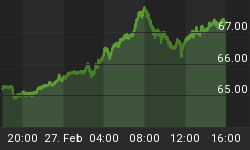Over the past half-century, the United States has seen its global dominance in dozens of industries slip away. One plum that we have maintained is our gargantuan financial services industry, whose contribution to total GDP more than tripled between 1947 and 2005. However, the current global financial crisis, manufactured on Wall Street and exported to the entire world, may result in the U.S. losing its financial crown as well.
Once upon a time America owned the automobile industry. But after several decades of excessive taxation, onerous government regulation, union extortion, and a crushing lack of foresight and innovation, we no longer dominate an industry that we practically invented. Just as Detroit no longer claims center stage in the world automobile marketplace, soon New York will lose its position at the center of global capital markets.
In the first place, the center of finance tends to go where the money is. Right now all the money is coming from Asia and the Middle East. When the United States was the world's greatest creditor nation and its largest supplier of capital it made prefect sense for that capital to be allocated here. But why should the Chinese send their savings to New York only to have it re-invested back in China? Wouldn't it make more sense for the Chinese to allocate their capital locally rather then out-sourcing the job to us?
In the second place, when the strength of the dollar was widely regarded it made sense for global savers to allocate substantial percentages of their savings to U.S. dollar denominated investments. This preference gave Wall Street a competitive advantage in attracting capital. However, now that confidence in the dollar has evaporated, perhaps permanently, this advantage has been lost. Further, investment in the U.S. was encouraged by America's respect for private property, low taxes, and minimal government regulation. However, this advantage has been lost as other nations have strengthened their private property laws, deregulated, and lowered taxes, while we have done the opposite. As a result, thus far this century, the returns on U.S.-based investments have far underperformed those achieved in every other major market.
Most importantly, Wall Street's reputation, once its greatest asset, is also in jeopardy. Just as Detroit lost its reputation for high quality cars, bankrupted dotcoms and worthless subprime debt are creating similar problems for Wall Street. You can't expect to keep your customers if you continually sell them shoddy merchandise. Wall Street has spread hundred of billions of dollars in losses around the world and in so doing shattered its reputation with some of its best customers.
However, in the last few years Wall Street has not only screwed customers but their own shareholders as well. At one time all of our major investment banks, such as Goldman Sachs, Lehman Brothers, Morgan Stanley, Bear Stearns, Smith Barney, Shearson, E.F. Hutton, Kidder Peabody and Solomon Brothers, were private partnerships. However, during the 1990's they all went public (of course many merged first so they no longer exist as independent firms). Goldman Sachs was the last to go public in 1999. The transition allowed Wall Street partners to cash out, transferring future risks to new shareholders. In so doing they were able to capitalize on bubble valuations, yet through lavish bonus compensation packages, still keep the lion's share of the profits for themselves. In other words they got to have their cake and eat it too.
As a result of this transfer of risks, the business models of America's leading financial institutions shifted, with profits coming from riskier sources such as proprietary trading and structured finance. To line their own pockets, Wall Street willingly exposed its shareholders to risks that it would never have assumed with its own capital. This moral hazard set the stage for the enormous losses shareholders are now suffering, and are a direct consequence of the phony profits booked in prior years. However, while shareholders are left holding the bag, Wall Street's former partners now turned employees have already walked away with huge IPO and stock option windfalls, as well as lavish bonuses paid on phantom profits.
The coming crash will plainly expose these conflicts of interest, and the reaction will be severe. In the end, finance and banking, like manufacturing, will be yet another industry lost to foreign competition. The new financial capitals will likely be in Asia, the Middle East, and Europe. New York will certainly still have a role to play, but much like Detroit, it will be but a shadow of its former self.
For a more in depth analysis of our financial problems and the inherent dangers they pose for the U.S. economy and U.S. dollar denominated investments, read my new book "Crash Proof: How to Profit from the Coming Economic Collapse." Click here to order a copy today.
More importantly, don't wait for reality to set in. Protect your wealth and preserve your purchasing power before it's too late. Discover the best way to buy gold at www.goldyoucanfold.com, download my free research report on the powerful case for investing in foreign equities available at www.researchreportone.com, and subscribe to my free, on-line investment newsletter at http://www.europac.net/newsletter/newsletter.asp.















